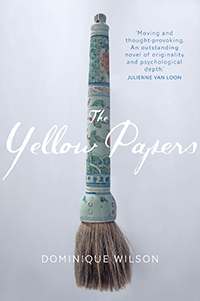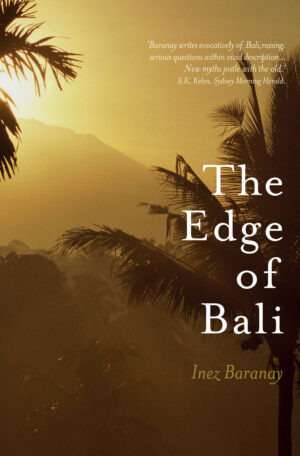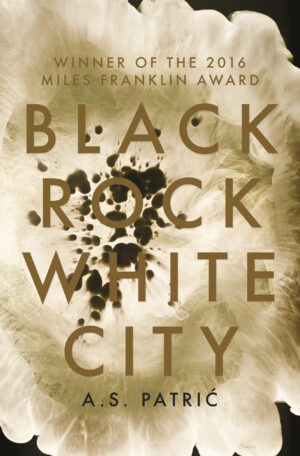This is a solid work of fiction, and author Dominique Wilson masterfully takes readers across the decades of a lifetime, from the 1870s to the 1950s, from a drought-stricken outback Australia to a decadent Shanghai and then a war-torn Asia.
Shaunagh O’Connor, The Weekly Times 27 June 2014
The first full-length novel from short story writer Dominique Wilson is a sorrowful but captivating historical epic, and a unique view of the formation of modern China. Spanning nine decades, The Yellow Papers charts the destinies of three main characters: a lowly Chinese peasant who flees to Australia following an unsuccessful mission to obtain ‘the secrets of the West’ in the US; a wealthy Australian man obsessed with his oriental lover; and a child of China’s Cultural Revolution. Wilson’s impeccable research helps her to convey a realistic impression of some of the significant political, intellectual and social changes in China’s development, and the impact this evolution has had on Western culture, particularly Australia. While this attention to historical detail adds authenticity to the narrative, it is Wilson’s well-crafted characters and shrewd storytelling that arouse all the emotions that great tragedy is supposed to evoke. To compare The Yellow Papers to the historical sagas of the kind that consistently rise to the tops of bestseller lists may seem to trivialise the importance of its subject matter, but the book will still satisfy a readership hungry for a gripping, grandiose read.
Four stars.
Jennifer Peterson-Ward, Bookseller and Publisher, October 2013
What stood out for me, and still does a week after reading it, is the way Wilson conveys the pain of war and racism – it’s honest, emotive, vivid and at times, raw. A recommended read for anyone who likes historical fiction and has a tendency to think over the issues raised for some time afterwards. A big thumbs up from me.
Monique Mulligan, Write Note Reviews, 20 March 2014
Write Note Reviews: The Yellow Papers
What separates The Yellow Papers from the usual historical saga is partly the way Wilson redefines ‘family’ to include Chen Mu, and partly the way she respects the reader’s intelligence and leaves some gaps in the 90-year chronology that can be inferred without needing to labour the point. Even so, at 348 pages, it’s quite a long novel, and some of it is quite confronting.
Edward is of an age to witness four wars, but it’s his last one, the Korean War, which finds him behind the lines and eventually a POW. Unsurprisingly, his dreadful experiences make him anti-Asian, which compromises his long-standing affection for Chen Mu and his feelings for Ming Li, the love of his life who he’d met in China during WW2, just in time to be separated as Mao Tse Tung’s Communists closed China to the world. Wilson is particularly good at rendering Edward’s confusion and guilt about reconciling his conflicting memories.
I was impressed by the uncompromising ending. The novel gathers tension towards the end, and the characters find themselves locked in a destructive pattern of relationships forged by ideology rather than human behaviour. I can’t say more without spoilers, but this is a novel that saves its biggest shock till the end.
Lisa Hill, ANZLitLovers, March 2014 – ANZ Lit Lovers: The Yellow Papers
Spanning almost a century of China’s formation, The Yellow Papers is about identity and home and begins after China’s defeat in the two Opium Wars when the peasant boy Chen Mu is sent to Connecticut to study the secrets of the West. He cuts his queue (pigtail), adopts Western clothes and treasures a copy of The Adventures of Tom Sawyer, but outside the Chinese Education Mission he meets mistrust and violence.
Fleeing America, Chen Mu finds himself head gardener on an Australian pastoral station where he mentors the farmer’s grandson, Edward, who grows up a wealthy dealer in Chinese antiques and falls for Ming Li, the wife of an upper-class Shanghai mandarin, shortly before Japan’s occupation of Shanghai.
Edward and Ming reunite but are parted by World War II, the Korean War and China’s Cultural Revolution.
Chen Mu is emblematic of the passage of people across borders, propelled by war, famine and political strife, who come to adapt to new ways without ever forgetting the old world.
Read more including profile of Dominique Wilson by:
Linda Morris. Sunday Age, Canberra Times. and Sydney Morning Herald , 20-23 March 2014 : Sydney Morning Herald
The yellow of the joss papers, too, appears throughout the story. Chen Mu, who cannot burn the papers for his mother later delivers yellow wartime telegrams in Australia, informing families of the death of their sons and husbands. Hung Ho, though determined to fight in the Red Army, is named for China’s Yellow River. In the aftermath of war in a dingy hotel room with an American sailor, Ming Li’s skin has a ‘jaundiced glow’. The characters’ link with China and their heritage is something they carry, willing or not, and their relationship with this heritage is something they must continue to negotiate throughout their lives.
The Yellow Papers is a moving read with broad scope. Wilson’s characters, particularly Chen Mu and Ming Li, are rounded and sympathetic, allowing Wilson to frame large and often abstract ideas of cultural identity, unrest and displacement through individual and personal stories. It’s a work that reminds us that culture is about people and that ideology affects the individual.
Margot McGoven, Lip Magazine April 2014 lipmag.com






